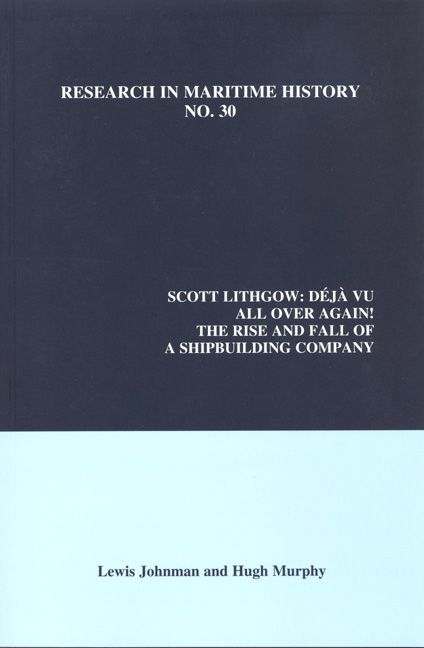Book contents
- Frontmatter
- Contents
- Acknowledgement
- Introduction
- Chapter 1 Scotts of Greenock, 1711-1945
- Chapter 2 Russell and Company to Lithgows Limited, 1874-1945
- Chapter 3 Scotts Shipbuilding and Engineering, 1945-1965
- Chapter 4 Lithgows Limited, 1945-1965
- Chapter 5 The Long March to Merger, 1965-1970
- Chapter 6 The Road to Nationalisation, 1970-1977
- Chapter 7 Nationalisation to Privatisation, 1977-1984
- Chapter 8 Déjà vu All over Again: Trafalgar House, 1984-1988
- Chapter 9 Conclusion
- Appendix
- Bibliography
Chapter 9 - Conclusion
- Frontmatter
- Contents
- Acknowledgement
- Introduction
- Chapter 1 Scotts of Greenock, 1711-1945
- Chapter 2 Russell and Company to Lithgows Limited, 1874-1945
- Chapter 3 Scotts Shipbuilding and Engineering, 1945-1965
- Chapter 4 Lithgows Limited, 1945-1965
- Chapter 5 The Long March to Merger, 1965-1970
- Chapter 6 The Road to Nationalisation, 1970-1977
- Chapter 7 Nationalisation to Privatisation, 1977-1984
- Chapter 8 Déjà vu All over Again: Trafalgar House, 1984-1988
- Chapter 9 Conclusion
- Appendix
- Bibliography
Summary
If one can draw inferences and parallels that would aid our understanding of the decline of the British shipbuilding industry from this study, the primary conclusion has to be that there was fundamental management failure whether in private hands or under state control. Moreover, at the local and national levels, no amount of post hoc gloss, such as blaming the trade unions, holds water unless the owners and managers had totally abandoned responsibility for the running of the business, which they did not do. Management after all is supposed to manage. As for governments, even bearing in mind the notoriously short attention spans of ministers, no long-term strategy for Britain's maritime industries existed during the period under consideration. Ad hoc solutions predominated, and even they deteriorated before nationalisation into little more than outdoor relief schemes for industrialists and employees. Employment issues and political considerations provided the motive for state intervention but not for efficiency, and nationalisation in 1977 only saved the inefficient rump (including the cosseted warship builders) of what before the Great War had been the world's greatest shipbuilding nation. By the time of nationalisation the descent into mediocrity and statistical irrelevance was well established, a decline that privatisation failed to halt.
That the British shipbuilding industry is now insignificant in world terms is beyond doubt. At the national level the three warship-building firms (Vickers, Vosper Thornycroft and Yarrow) still survive, although both Vickers and Yarrows are under the BAe umbrella, as is Govan. The past recipient of massive government largesse, Harland and Wolff has now closed. The small but innovative Devon yard at Appledore survives, but closure looms there as well. Although management failure was the primary cause of the demise of Scott Lithgow, other factors were also important. While it does not necessarily follow that this is true of all firms in the industry, there is a strong suspicion that this is the case. Indeed, this is why micro-studies like this are important, and why more are needed if we are fully to understand the underlying reasons for the decline of the British shipbuilding industry.
As one former worker recalled on visiting Cartsdyke in 1993:
An assortment of redundant shipyard equipment, much of it hidden by shrubbery, littered the site. However, the two concrete slipways, which stretched 600 feet in length and declined lighdy towards the water's edge, were relatively clear of Vegetation. […]
- Type
- Chapter
- Information
- Scott LithgowDéjà Vu all over again! The Rise and Fall of a Shipbuilding Company, pp. 343 - 344Publisher: Liverpool University PressPrint publication year: 2005



